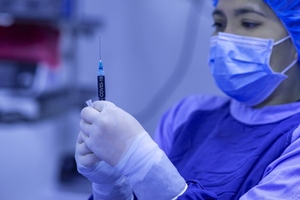UKHSA updates clinical guidance on vaccinations for 12 to 17 year olds
Following a review of evidence by the Joint Committee on Vaccination and Immunisation (JCVI), advice on second doses for young people aged 16 to 17 was issued earlier this week.

For those aged 16 to 17 who have had coronavirus (COVID-19) infection, the second vaccine dose should be given 12 weeks or more following the first vaccine dose, or 12 weeks following a positive COVID-19 test result – whichever is later.
To be consistent with this advice, the clinical guidance has also been updated by the UK Health Security Agency (UKHSA) to recommend that young people aged 12 to 17 who are not in a high risk group should wait 12 weeks after a positive test showing COVID-19 infection before getting their first (or second if aged 16 to 17) vaccine dose.
This increase from 4 weeks is based on the emerging evidence from the UK and other countries, which suggests that leaving a longer interval between infection and vaccination may further reduce the already small risk of myocarditis in younger age groups.
Dr Mary Ramsay, Head of Immunisations at UKHSA, said:
The COVID-19 vaccines are very safe. Based on a highly precautionary approach, we are advising a longer interval between COVID infection and vaccination for those aged under 18. This increase is based on the latest reports from the UK and other countries, which may suggest that leaving a longer interval between infection and vaccination will further reduce the already very small risk of myocarditis in younger age groups.
Young people and parents should be reassured that myocarditis is extremely rare, at whatever point they take up the vaccine, and this change has been made based on the utmost precaution.
We keep all advice under constant review and will revise it according to the latest data and evidence.
The COVID-19 vaccines are safe and if you or your child has experienced no symptoms of myocarditis then there is no reason to be worried if they had their first dose at less than 12 weeks following infection.
Anyone who is concerned should be reassured that these side effects occur within a few days of vaccination. Most people recovered and felt better following rest and simple treatments.
If younger people experience any of the following symptoms after receiving their vaccination, they should call 111 or see their GP:
- pain and/or tightness in the chest which may spread across the body
- pain in the neck that may spread across the shoulders and/or arms
- shortness of breath when lightly exercising or walking
- difficulty breathing when resting or feeling light-headed
- flu-like symptoms such as a high temperature, tiredness and fatigue
- palpitations or an abnormal heart rhythm
- feeling like you need to be sick
In younger people, protection from natural infection is likely to be high for at least 3 months so they will be protected against COVID-19 infection for some time, meaning teenagers and parents should not be concerned about prolonging the date when they can get vaccinated to 12 weeks following prior infection.
Those aged 18 and above should still take up their vaccine offer if they are 4 weeks post a positive test. This is because they are at higher risk of the complications of COVID-19 infection.
This change does not affect those aged 12 to 17 in clinical at-risk groups. These individuals should still take up their vaccine offer if they are 4 weeks post a positive test and continue to receive their second dose 8 weeks after the first. This is because their individual risk of severe outcomes from COVID-19 is higher and so outweighs any benefit of delaying to 12 weeks.
UK Health Security Agency press office
Nobel House
17 Smith Square
London
SW1P 3JR